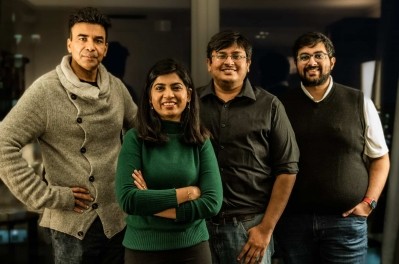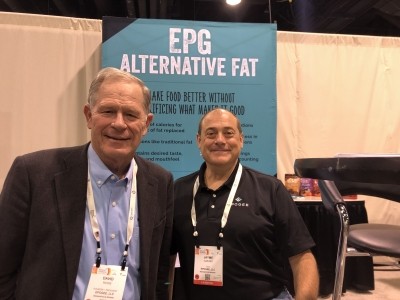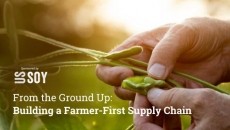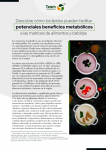‘A quantum leap in taste and experience of alternative protein products…’ Nourish Ingredients raises $28.6m to commercialize designer animal-free fats in 2023

"The first generation of alternative proteins made waves, mostly with vegans and vegetarians, but they didn’t convert carnivores into return customers,” claimed co-founder and CEO James Petrie, who said Nourish aims to take its first product, “fats that provide a meaty aroma and taste,” to market next year.
“By overlooking fats, the market has missed the most essential element to the taste experience. That's where Nourish comes in,” added Petrie, who is based in Canberra, Australia, but says Nourish’s initial focus will be North America, although it also has southeast Asia and Europe in its sights.
What’s wrong with the current toolbox?
So what are the limitations of the existing toolbox when it comes to fats in meat and dairy alternatives?
Widely-used harder fats such as coconut oil are not distributed throughout meat alternatives in the same way that fat is distributed in animals, and have a tendency to leak out during cooking and impart a coconutty smell, claimed Petrie.
“They don't resemble animal fats closely enough, in terms of their performance, mouthfeel, flavor and aroma.”
They are also in limited supply, added Petrie, a crop metabolic engineer who worked as a research scientist at Australia’s national science agency CSIRO before co-founding Nourish with Ben Leita in early 2020.
“So there are different challenges right now we hear from our customers; they've got problems in both the function side of things on cooking performance, mouthfeel, and melt profile, but they've also got problems around taste.”
Animal-like fats: High impact, low inclusion rates
Replacing even small amounts of coconut oil with more ‘animal-like’ fats can have a dramatic impact on the sensory experience, he claimed.
“A lot of the animal fats can be readily substituted with plant fats, and they should be; it makes no sense to waste fermentation capacity on stuff that can be readily produced by plants. We’re just replacing the parts that need to be animal-like to get a really potent effect.
“When you cook a plant-based burger with it [Nourish’s fat] you get this sniff off the pan, that taste that grabs you by the hindbrain and says you're eating something animal.
“Some of the stuff we've been tasting recently is just outstanding and we're getting really good feedback.”
While all meat types taste different, he said, “What we want to add in is that base animalic taste whether it be pork, or beef, or chicken as there are some fats that are common across those different products, and if you do it right, you can have one formulation that is actually quite applicable to a bunch of meats.”
Designer fats
Right now, there are several firms working in the burgeoning designer fats space, with some genetically engineering microbes such as yeast, others making cell-cultured fat (by growing real fat cells in a bioreactor like Mission Barns), some genetically engineering plants, and some playing around with the structure of plant oils through emulsions and oleogels.
So are microbes efficient at producing fats at scale?
Unlike companies using microbes to produce proteins, where yields can be a challenge, said Petrie, “We're relatively fortunate as we have strains that are already very happy to make a lot of fat, which is not the case in the protein world; the challenge for us is less about increasing the yield and more about tuning the type of fat that's being produced.”
‘It makes sense to us to have multiple approaches to try and solve the scale issue’
While Petrie confirmed Nourish is using genetically engineered oleaginous yeast strains to produce its animal-like fats, it’s not yet ready to get into detail about the composition of the fats or the downstream processing and purification process, which can have a big impact both on costs and the regulatory and labeling piece for products produced via precision fermentation.
But he added: “Every time you add a downstream processing step, you add cost, and sometimes it can be quite considerable, so there's a balance to be had between regulatory considerations around what new material you're adding, downstream processing cost, and then how effective that material is in the final food.”
Fermentation capacity
As for the well-publicized challenges around fermentation capacity, he said: “The challenge is that it's a complex system rather than a single vessel, so you need to have all of the equipment associated with the fermentation and the downstream processing. You might have deep watering steps, separation steps, extraction and purification steps, which all require their own specific equipment.
“So it makes sense to us to have multiple approaches to try and solve the scale issue. But by focusing on the potent molecules, we don't have to necessarily have large quantities in order to make a meaningful difference in products. So we’ll go after the lowest hanging fruit in terms of what's going to make the biggest impact to the taste the flavor, the performance, and then we can go after the volumes over time.”
He added: “We're in the process of building our own capacity now, but we also need capacity from others and so we're in the process of either finding in some cases, or in other cases implementing those plans now.”
Labeling and regulatory: ‘We’re still working through the name and the label’
On labeling (what do you call animal-free animal fats?), it’s an open question that Nourish is wrestling with, but has not yet nailed down, said Petrie, who said the regulatory path in the US would likely be a GRAS determination, while in Europe it would likely be the Novel Food Regulation.
“We’re still working through the name and the label; it’s also a discussion with customers to try and figure out what works best for their product in which market because some of these issues are jurisdiction dependent.
“We're doing an audit at the moment of the [precision fermentation] ecosystem and how companies are doing labeling and there's enormous range from things like ‘non-animal whey protein’ to very specific strain identifiers. We feel that the label needs to be informative and transparent to the consumer, but we don't have answers fully developed yet.”
When it comes to regulatory filings, producing fats via microbial fermentation is slightly more complex than some of the proteins that have been commercialized such as Perfect Day’s beta-lactoglobulin whey protein, he noted.
“With a single discrete protein, you can prove it is biologically and chemically identical to what is present in an animal, but fats are complex mixtures, so we're at the moment working through exactly how we address that in the regulatory process.”
The pipeline: ‘We are very actively looking at dairy’
Asked about the pipeline, he said Nourish is also looking at dairy fats: “We are very actively looking at dairy. We don't have any announcements to make around our dairy products yet, but we understand the need for better dairy products both in traditional and also new foods, so we see a huge opportunity in dairy.”
Interested in meat alternatives?
Register for our upcoming FREE-to-attend virtual summit: Futureproofing the Food System, November 15-17, which features a session on 'The Future of Meat' featuring:
- Ethan Brown, co-founder and CEO, Beyond Meat
- Dr Lisa Dyson, founder and CEO, Air Protein
- Dr Tyler Huggins, co-founder, Meati Foods
- Abena Foli, head of regulatory affairs, Orbillion Bio
- Dr Elliot Swartz, lead scientist, cultivated meat, The Good Food Institute






















